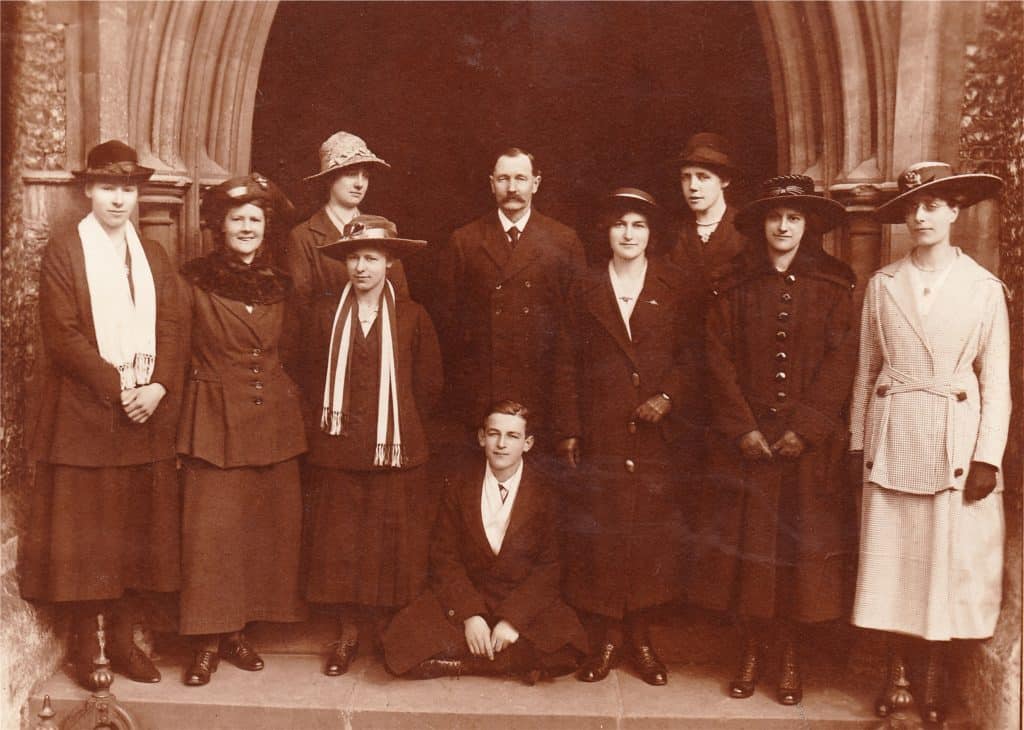
In the early months of the war women undertook traditionally supportive roles: knitting, sewing sandbags and collecting medical supplies. Some established a hospital supply depot in Dorking, raising funds by operating a waste paper depot. Others joined up as VAD nurses, serving at Anstie Grange or overseas.
As men left for the services, manpower grew scarce. Women took over community organisations, from bell-ringing to businesses. And they moved into areas of work that been previously reserved for men. In 1914 Frances Morris became temporary head teacher at South Holmwood School ; Lucy Strudwick saw the school through from 1916 to the end of the war. Newdigate School also appointed its first female head teachers.
Women became postal workers, munitions workers, station ‘masters’ and shop workers. Ralph Vaughan Williams was surprised to find 17 year-old Ann Stewart installing his telephone at Leith Hill Place. Like many others she was out unchaperoned, meeting people in an official and skilled capacity. Some even lost their lives whilst on war service.
When declining imports lead to food shortages the War Agricultural Service mobilized female labour in the fields. Some local farmers were sceptical: a farmer’s wife from Newdigate wrote to the paper: ‘Woe betide England if the land falls to women to cultivate!’ But by 1918 demand for female labour well exceeded demand as farmers struggled to bring in harvests.
The war changed what was thought acceptable or possible for women. One, Daisy Wadling, was even given a full military funeral at Dorking cemetery.
At the end of the war many returned to traditional roles, but they had changed attitudes towards women’s capabilities.
Maggie Worrow
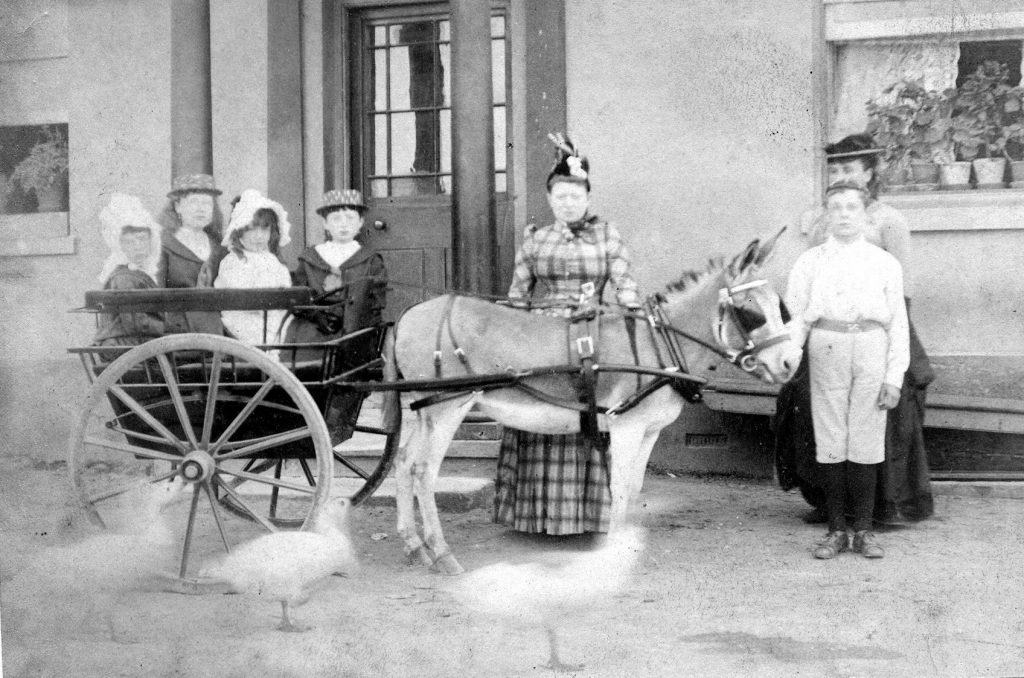
(Photo courtesy of Eileen Fox)
Maggie Worrow’s husband, Issac ‘Jack’ Worrow, was the landlord of the Norfolk Arms hotel at Mid Holmwood. The inn was a very busy one, serving the traffic on the road south from Dorking. It hosted meetings and events of all the local clubs and societies in its back room. It was also the home of the Holmwood branch of the Ancient Order of Foresters.
When Jack was called to war Maggie took over the business. She also took over his role as treasurer of the Foresters. The Foresters was a mutual organisation which supported people in times of adversity, ill-health, and old age. It also offered loans and mortgages, and a community banking service. Nearly all the working people in the village were members and it was the social focus of the village.
Before the war women had not even been allowed to join the Holmwood Foresters, (though a separate women’s section had been proposed in 1912). Now a woman was key to running it.
Mrs and Miss Turner
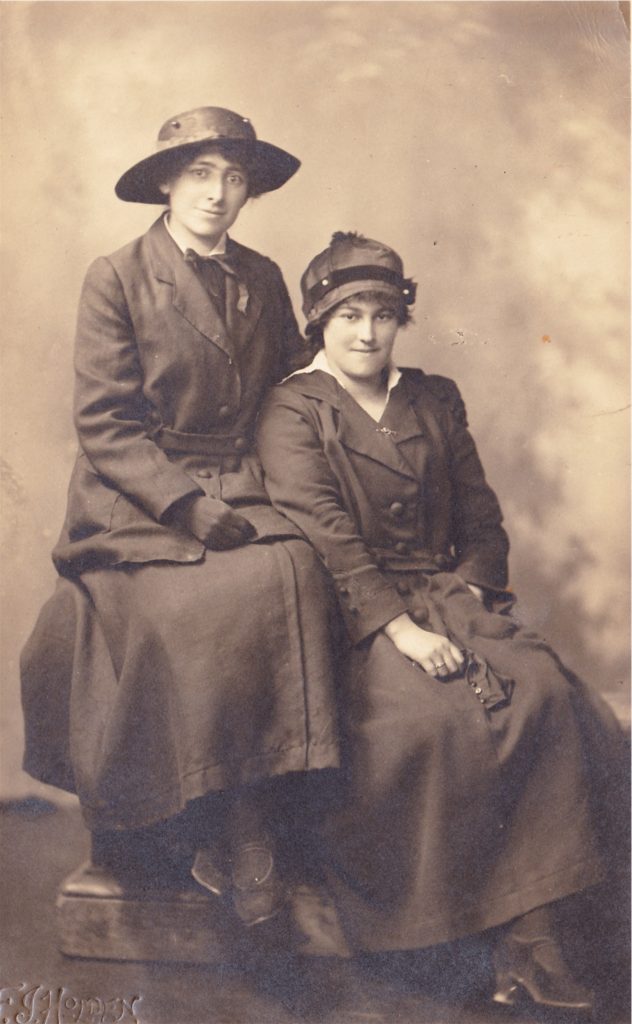
Mrs and Miss Turner of Dorking in their working clothes. In 1916 they were doing ‘war work’ at a butcher’s on Dorking High Street. Their clothes are plainer and more practical than pre-war women’s fashions
Edith Sheppard
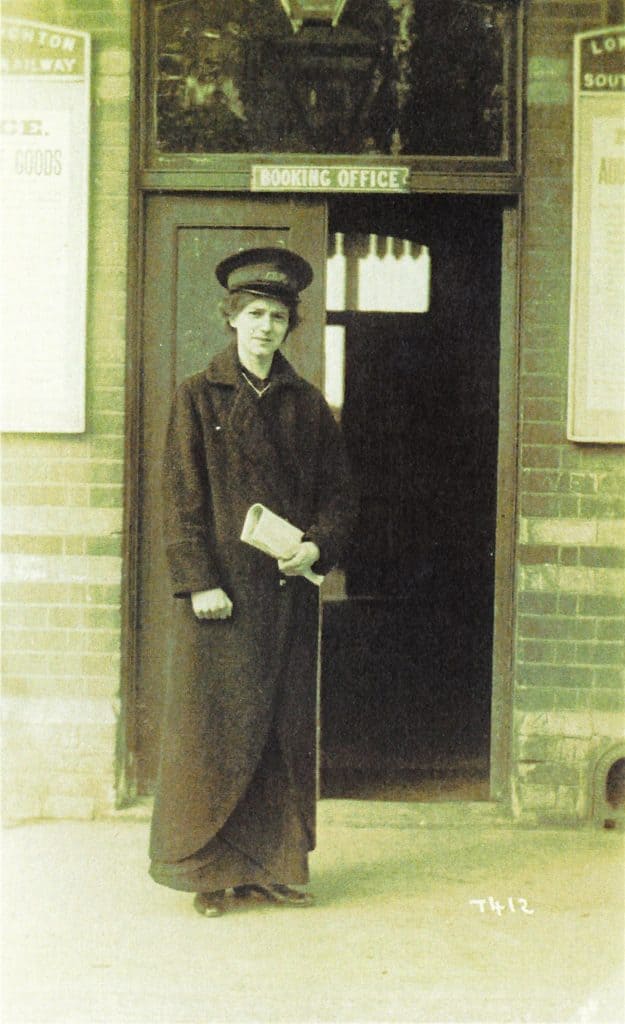
Edith Sheppard’s life and opportunities changed completely because of the war. She was able to take up a job that had only been open to men before.
Edith was born in 1891. Her father had been the stationmaster at Ockley. During the war there was a shortage of railway staff as men enlisted or were conscripted. Some stations, like Box Hill Station, closed for lack of staff.
Edith became one of the first women stationmasters, at Ardingly in West Sussex. She then moved to Dorking to become the stationmaster there. With military and civilian transport dependent on the railways, it was a very responsible job and not one that would have been entrusted to a woman before 1914.
Edith married Cyril Turner in 1921 and lived in Dorking. After the war many women returned to traditional roles, but they had changed people’s ideas about what women could do.
Nellie Peters
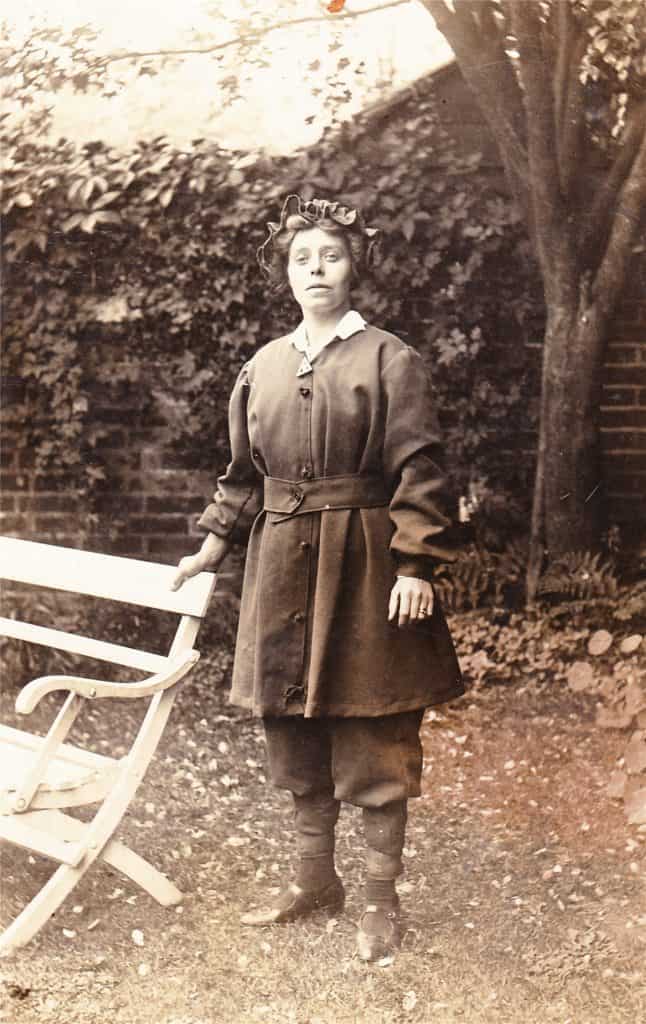
In 1916 Nellie Peters was working for the war effort at the gunpowder works in Chilworth.
Nellie was born in 1891. By the age of nine she was an inmate at Dorking Workhouse with her five brothers and sisters. Before the war she worked as a servant at the Black Horse public house on the High Street.
The gunpowder works was established at Chilworth in the 17th century. Work there was dangerous, and not just because of the explosives the women were
handling. The works was a target for German zeppelins and the nearby church was camouflaged so that its spire could not be used to navigate towards the factory. In 1915 a series of bombs was dropped on Guildford as a pilot tried to find and blow up the works.
Evangeline ‘Eva’, Lady Farrer
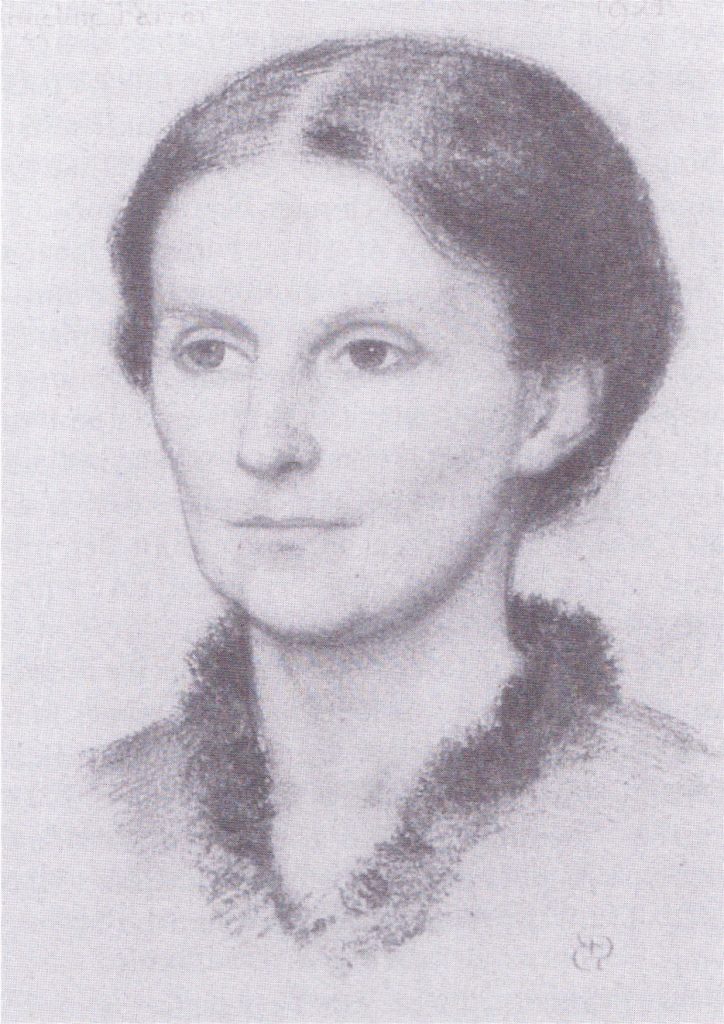
© Dorking Museum
Evangeline ‘Eva’, Lady Farrer of Abinger was a founder of the Leith Hill Musical Competitions before the war. She established the Dorking Hospital War Supply Depot which supplied field hospitals with bandages and dressings. The Depot ran working parties in Abinger, Betchworth, Newdigate, Ockley, Ranmore, Holmwood, and Westcott.
In 1919 the Dorking & Leatherhead Advertiser reported that the volunteers had worked through heat and snow, through anxiety and personal sorrow,and had never failed to ‘toil and not to seek for rest’. (Portrait by Charles Geoffroy- Dechaume)
Grace King
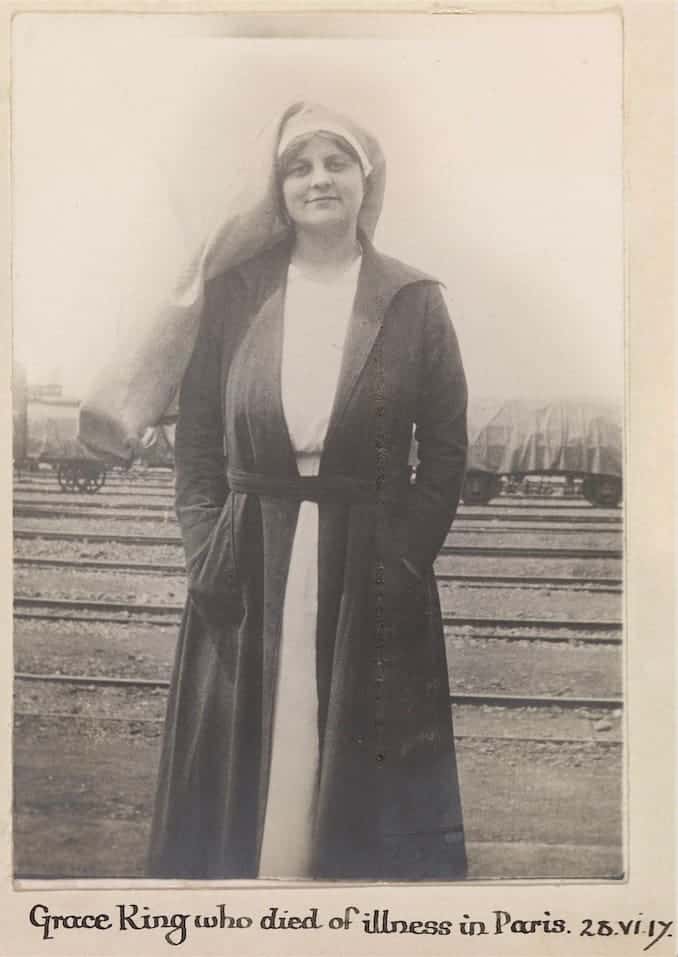
Grace King is the only woman whose name appears on a local war memorial, the cross in St James’s church yard in Abinger. Grace was born in 1893. She was the youngest daughter of builder George King of Abinger Hammer, and his wife Elizabeth. Before the war she attended a boarding school in Ramsgate. Grace was serving at the Cantines des Anglais in Paris when she was taken ill. She died in Paris on 28th July 1917 at the age of 24. It is not known what killed her. The inscription on her grave reads: ‘A soldier’s grave the best for thee’.
Daisy Wadling
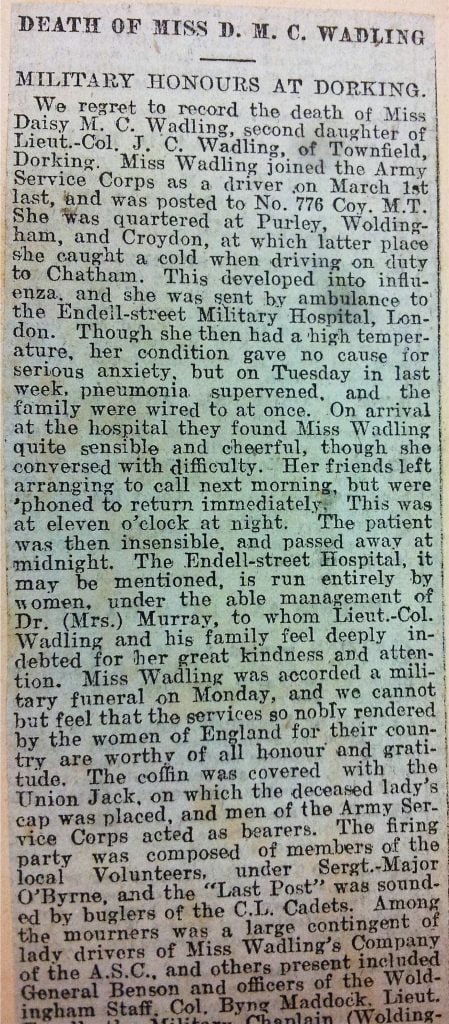
DEATH OF MISS D.M.C WADLING
MILTARY HONOURS AT DORKING
We regret to record the death of Miss Daisy M. C. Wadling, second daughter of Lieut-Col. J. C. Wadling, of Townfield, Dorking. Miss Wadling joined the Army Service Corps as a driver on March 1st last, and was posted to No. 776 Coy. M. T. She was quartered at Purley, Woldingham and Croydon, at which latter place she caught a cold when driving on duty to Chatham. This developed into influenza, and she was sent by ambulance to the Endell Street Military Hospital, London. Though she then had a high temperature, her condition gave no cause for serious anxiety, but on Tuesday in last week, pneumonia supervened, and the family were wired at once. On arrival at the hospital they found Miss Wadling quite sensible and cheerful, though she conversed with difficulty. Her friends left arranging to call next morning, but werre ‘phoned to return immediately. This was eleven o’clock at night. The patient was then insensible and passed away at midnight. The Endell Street Hospital, it may be may be mentioned, is run entirely by women, under the able management of Dr. (Mrs.) Murray to whom Lieut-Col. Wadling and his family feel deeply indebted for her great kindness and attention. Miss Wadling was accorded a military funeral on Monday, and we cannot but feel that the services so nobly rendered by the women of England for their country are worthy of all honour and gratitude. The coffin was covered with the Union Jack, on which the deceased lady’s cap was placed, and men of the Army Service Corps acted as bearers. The firing party was composed of members of the local volunteers, under Sergt.-Major O’Bryne, and the “Last Post” was sounded by buglers of the C. L. Cadets. Among the mourners was a large contingent of lady drivers of Miss Wadling’s Company of the A.S.C. and other present included General Benson and officer of the Woldingham Staff, Col Byng Maddock, Lieut Favell,
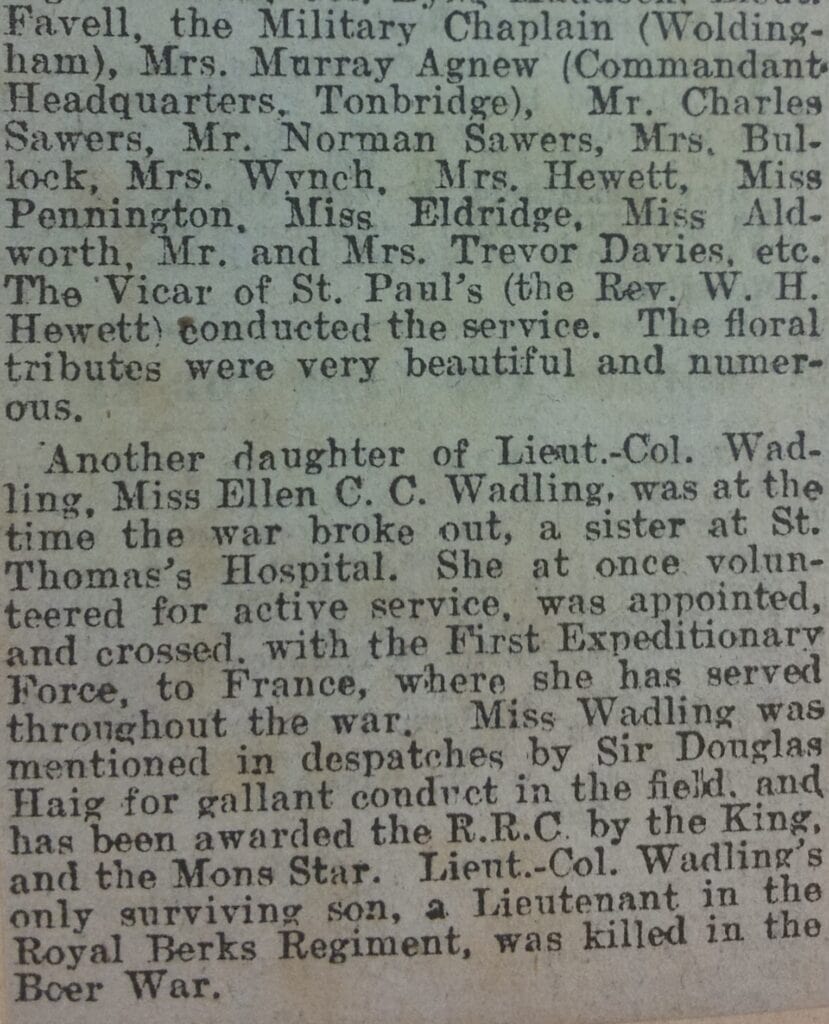
the Military Chaplain (Woldingham), Mrs. Murray Agnew (Commandant Headquarters, Tonbridge), Mr. Charles Sawers, Mr. Norman Sawers, Mrs. Bullock, Mrs. Wynch, Mrs. Hewett, Miss Pennington, Miss Eldridge, Miss Aldworth, Mr. and Mrs. Trevor Davies, etc. The Vicar of St. Paul’s (the W. H. Hewett) conducted the service. The floral tributes were very beautiful and numerous.
Another daughter of Lieut.-Col. Wadling, Miss Ellen C. C. Wadling, was at the time the war broke out, a sister at St. Thomas’s Hospital. She at once volunteered for active service, was appointed, and crossed, with the First Expeditionary Force, to France, where she has served throughout the war. Miss Wadling was mentioned in despatches, by Sir Douglas Haig for gallant conduct in the field and has been awarded the R. R. C. by the King and Mons Star. Lieut. Col. Wadling’s only surviving son, a Lieutenant in the Royal Berks Regiment, was killed in the Boer War.
Daisy Wadling Obituary © Dorking Advertiser
Daisy Wadling is the only woman to have received a full military funeral in Dorking. Daisy was the daughter of Lt Col Wadling. As a child she lived all over Britain with her military family. In 1918 she was serving as a driver with the Royal Army Service Corps in Croydon. When she fell ill with influenza she was taken to the Endell Street Military Hospital in London. Daisy died of pneumonia at Endell Street on 5th November 1918. She was 43.
Her body was returned to Dorking where her family was living at Townfield. She was given a
full military funeral at Dorking Cemetery. Her coffin was covered with a Union flag, her military cap placed on top, and carried by ASC bearers. A party of local volunteers fired the salute and cadet buglers sounded the Last Post.
‘We cannot but feel that the services so nobly rendered by the women of England for their country are worthy of all honour and gratitude’ wrote the Dorking Advertiser. But unlike those of male service personnel who died of natural causes whilst serving, Daisy’s name does not appear on the town war memorial.
Daisy’s sister, Ellen, crossed to France with the British Expeditionary Force and served as a nurse throughout the war. She was mentioned in dispatches for gallant conduct and was awarded the Royal Red Cross for exceptional services in military nursing, and the Mons Star.
Mrs Rose
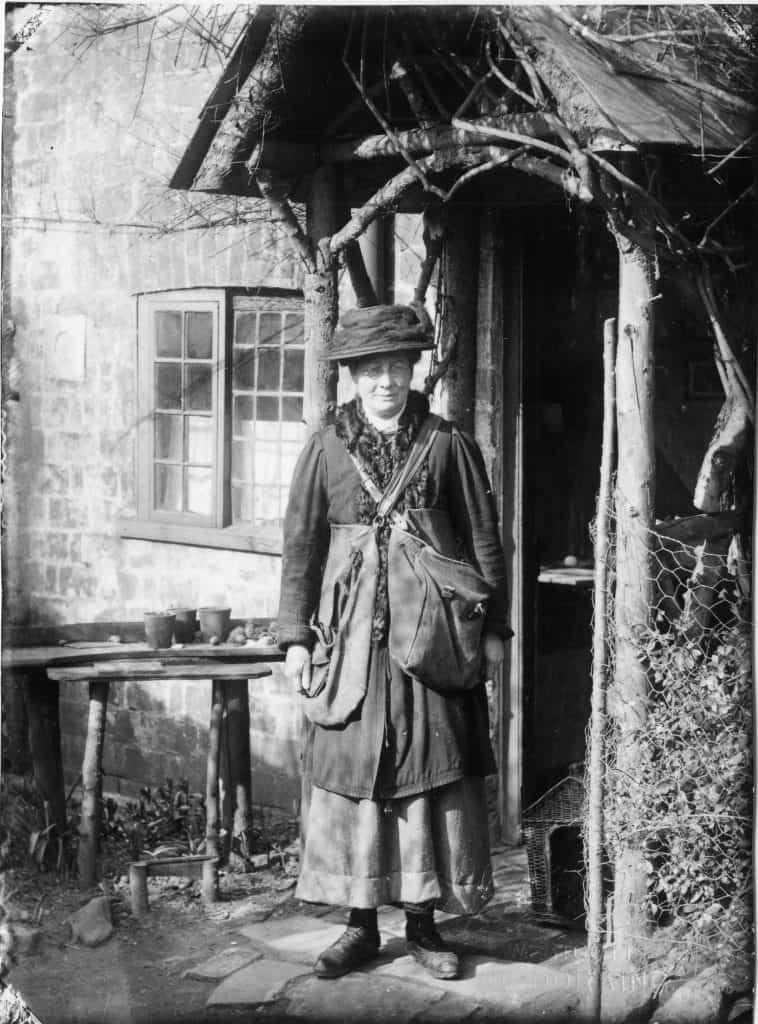
Mrs Rose of Westcott on her post office delivery round. A high percentage of postal workers were serving in the forces.
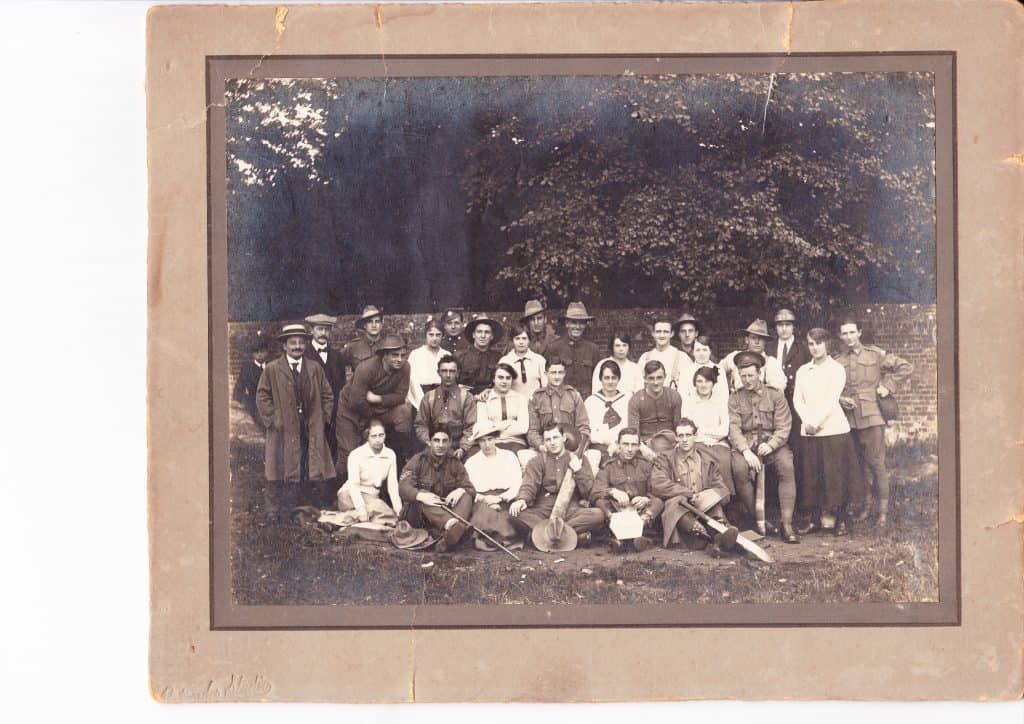
In September 1916 Dorking ladies’ cricket team played Anzacs from Epsom on Cotmandene. The match was eight-aside and the Anzacs were handicapped by having to bat and bowl reverse-hand. The Anzacs were bowled out for 24 and the ladies won by 11 runs.
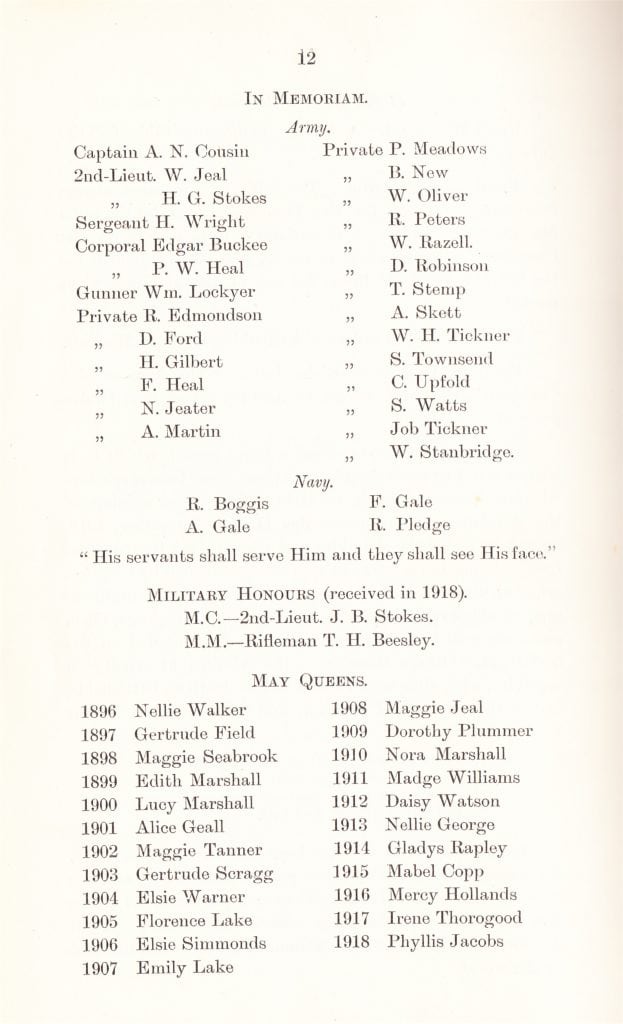
The Dorking British School Roll of Honour lists pupils who had been killed next to the May Queens for the same period. It is a poignant reminder of the differing expectations of male and females and of their fates.
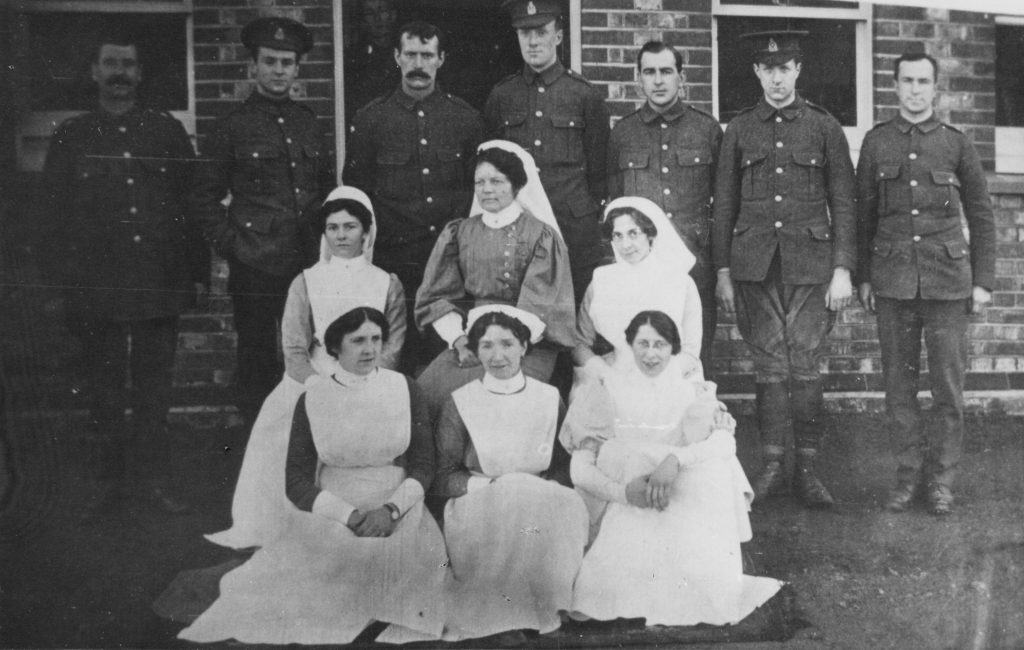
Wartime staff at Dorking Isolation Hospital in Logmore Lane, Westcott. Many local women volunteered as VAD (auxiliary) nurses. They served overseas and in local military hospitals; several worked at the Anstie Grange Military Hospital. Wealthier women had usually not worked outside the home before the war.
Last : Voluntary Aid Nurses
Next : The Impact of the Somme

